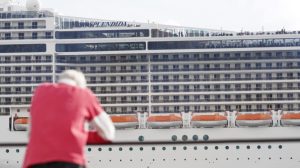The International Maritime Organisation (IMO) has approved a first-of-its-kind system to reduce pollution from ships worldwide that entails financial penalties if the stipulated limits are exceeded.
“The IMO’s Net-Zero Framework is the first in the world to combine mandatory emission limits and GHG [greenhouse gas emissions] prices across an entire industrial sector,” the organisation said in a statement.
Approved by the Marine Environment Protection Commission during its 83rd session, held in London between the 7th and 11th of April, the measures include new rules for the use of fuel from ships and a mechanism for setting prices for emissions.
According to the draft regulation, ships must start using a mixture of fuels to reduce polluting emissions.
Ships emitting above the stipulated limits will have to purchase credits from other less polluting ships or make financial contributions to the IMO’s Net-Zero Fund.
This fund will reward low-emission ships, but also finance innovation and technological research, support infrastructure in developing countries and mitigate the impact of climate change in more vulnerable countries.
The Associated Press agency said that a minimum fee of $100 (88.4 euros at the current exchange rate) will be charged for each ton of greenhouse gases emitted excessively by ships, which could generate revenues of about $10 billion (8.84 billion euros) per year.
The IMO’s goal is to achieve carbon neutrality by 2050.
These measures will now be transposed into the International Convention for the Prevention of Pollution from Ships (MARPOL), which covers 97% of the world’s fleet of freight ships, to be discussed and approved in detail next year and enter into force in 2027.
The approval of the measures represents another step in the “collective efforts to combat climate change and modernise maritime transport and demonstrates that the IMO fulfills its commitments,” said the organisation’s secretary-general, Arsenio Dominguez.
“It is now important to continue to work together, create dialogue, and listen to each other; so that we can create and adopt carbon-neutral conditions.
Despite the progress, the agreement did not gather consensus, being considered insufficient by countries most affected by global warming and by non-governmental organisations (NGOs) and unsatisfactory by the main oil-producing countries.
In the vote, 63 countries were in favour, including the European Union, Brazil, China, India, and Japan, 16 voted against, namely Saudi Arabia, Russia and the United Arab Emirates.
Pacific island countries, along with other countries, have advocated a tax on all polluting emissions from ships, not just those in excess of the limit, choosing to abstain in protest.
Samantha Gannon
info at madeira-weekly.com
Views: 1














